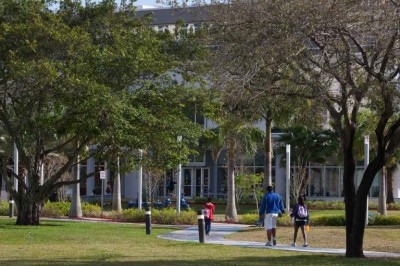NSU Newsroom
SharkBytes
Horizons
This version of NSU News has been archived as of February 28, 2019. To search through archived articles, visit nova.edu/search. To access the new version of NSU News, visit news.nova.edu.
This version of SharkBytes has been archived as of February 28, 2019. To search through archived articles, visit nova.edu/search. To access the new version of SharkBytes, visit sharkbytes.nova.edu.
NSU Receives 2013 Tree Campus USA Designation from The Arbor Day Foundation
 The Arbor Day Foundation recently announced that Nova Southeastern University (NSU) has earned its 2013 Tree Campus USA designation. Tree Campus USA is a national program launched in 2008 by the Arbor Day Foundation and Toyota to honor colleges and universities and their leaders for promoting healthy trees and engaging students and staff in the spirit of conservation.
The Arbor Day Foundation recently announced that Nova Southeastern University (NSU) has earned its 2013 Tree Campus USA designation. Tree Campus USA is a national program launched in 2008 by the Arbor Day Foundation and Toyota to honor colleges and universities and their leaders for promoting healthy trees and engaging students and staff in the spirit of conservation.
To achieve this recognition, NSU had to meet five core standards for sustainable campus forestry. The standards include the establishment of a tree advisory committee, development of a campus tree-care plan, dedicated annual expenditures for its campus tree program, an Arbor Day observance and the sponsorship of student service-learning projects.
NSU has an inventory of approximately 6,000 trees and strongly promotes environmental stewardship and responsible campus tree care. Students and faculty from the Environmental Science program at NSU’s Farquhar College of Arts and Sciences and volunteers participate in service learning projects on campus. For example, as part of a Tree Campus USA project, students and faculty installed a native garden on NSU’s main campus in Davie, Fla., in 2013. As part of their research, the students monitored and measured the amount of insects and animals living in the area. Adjacent to the native garden, faculty and staff also designed and built a raised bed working medicinal garden for students to cultivate and use the plants for experimental learning projects conducted throughout the year.